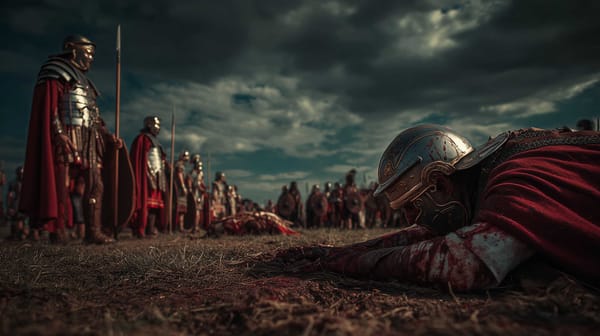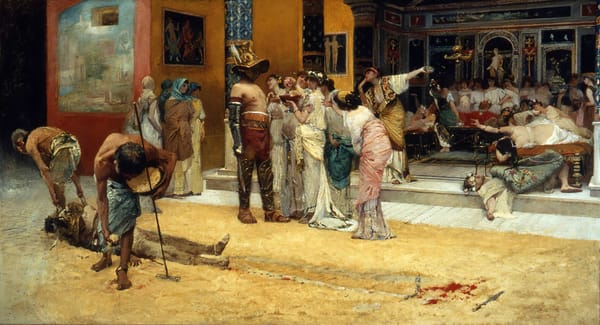The Mystery of the Lost Roman Legion: The Ninth's Final March
The Ninth Legion, Rome's elite military unit, vanished in the mists of ancient Caledonia. Their final march, shrouded in mystery and legend, remains one of history's most enduring enigmas, a tale of courage, fate, and the supernatural.

Disclaimer
This story is based on historical figures, but is ultimately a work of fiction. We're a small team of human writers, fascinated with Ancient Rome and its myriad myths and legends. Narrating fantastical stories to each other started as a hobby; and with the help of AI tools, we are able to share our passion with the rest of the world. We wholeheartedly wish you enjoy our craft – Carpe diem.
In the annals of the Roman history, many tales of valor, conquest, and glory are recounted with pride. Yet, there exists a chapter, shrouded in mystery and whispered in hushed tones - the enigmatic disappearance of the Ninth Legion. This formidable military unit, once the pride of the Roman Empire, vanished without a trace, leaving behind a trail of questions, theories, and legends.
The Ninth Legion: Rome's Pride
The Legio IX Hispana, commonly known as the Ninth Legion, was one of Rome's most elite military units. Established by Pompey in 65 BC, it had carved a legacy of conquests, from the scorching deserts of the Middle East to the snow-capped peaks of the Alps. Their emblem, the fierce and majestic bull, was a testament to their strength and tenacity.
By the 2nd century AD, the Ninth had been stationed in Britain, tasked with expanding Roman territories and quelling any resistance. Their fortresses dotted the landscape, and their presence was a constant reminder of Rome's might.
The Last Known Journey: The Ninth's Foray into Caledonia
In the heart of the Roman Empire, the year 117 AD was shaping up to be one of significant strategic importance. The vast territories of Rome, stretching from the sun-drenched sands of Africa to the cold, rugged terrains of Britannia, were mostly at peace. But in the northernmost reaches of the Empire, beyond the formidable Hadrian's Wall, the wild lands of Caledonia beckoned.
The Directive from Rome
Emperor Trajan's ambitions were clear. The Roman Empire, in its relentless pursuit of expansion, had set its sights on Caledonia. Lucius Aemilius Karus, a seasoned general with a string of military successes, was chosen to lead this mission. The orders, etched on a bronze tablet, were explicit: march the Ninth Legion north, penetrate the heart of Caledonia, and bring the Pictish tribes under the Roman banner.
Preparations and Morale
The Ninth Legion, a force of over 5,000 battle-hardened soldiers, began their meticulous preparations. Eboracum, where they were stationed, buzzed with activity. Blacksmiths worked overtime, sharpening gladii and reinforcing shields. Supplies were loaded onto wagons, and scouts were dispatched to gather intelligence on the terrain and the enemy.
The night before their departure, a grand feast was held. Wine flowed freely, and the soldiers sang songs of valor, recounting their previous victories. Yet, amidst the revelry, there was an undercurrent of tension. The tales of Caledonia, of its fierce warriors and treacherous landscapes, had not gone unheard.
The March Begins
Dawn broke with a crimson hue, casting a golden glow on the Ninth as they set forth. The sight was awe-inspiring: thousands of soldiers, their armor polished to perfection, reflecting the sun's rays. The legion's standard, the majestic golden eagle, soared above them, symbolizing the might of Rome.
The rhythmic cadence of their march, the clinking of their armor, and the determined looks on their faces spoke of discipline and determination. Villages along the way stopped to gaze at this impressive procession, and children ran alongside the soldiers, their eyes wide with a mix of fear and admiration.
Into the Unknown
As the Ninth progressed further into Caledonia, the challenges became evident. The well-maintained Roman roads gave way to muddy trails. The rolling plains of Britannia transformed into dense, dark forests where the canopy was so thick that it seemed like perpetual twilight. The marshes were treacherous, with soldiers often finding themselves waist-deep in cold, murky waters.
The mist-covered hills of Caledonia were deceptive. More than once, the scouts reported seeing shadows flit between trees, only to find nothing upon closer inspection. The eerie silence of the forests was occasionally broken by distant war cries, reminding the Romans that they were in hostile territory.
The cold was biting, and campfires became essential not just for warmth but for morale. Around these fires, the soldiers would gather, sharing stories to distract themselves from the looming threat of the Picts.
The Pictish Challenge
The Picts, unlike any enemy the Ninth had faced before, were masters of their terrain. They used guerrilla tactics, striking swiftly and then melting away into the forests. Their knowledge of the land gave them a distinct advantage, allowing them to set up ambushes in places the Romans least expected.
Lucius Aemilius Karus, ever the strategist, held councils with his centurions every night, adjusting their strategies based on the day's experiences. He knew that to conquer Caledonia, they had to not just defeat the Picts in battle but also understand and respect the land.
A Journey of Perseverance
Days turned into weeks. The initial confidence of the Ninth was tempered by the challenges they faced daily. Yet, their resolve never wavered. Every obstacle, every skirmish with the Picts, only strengthened their determination to complete their mission.
As they delved deeper into Caledonia, the true test of their mettle was yet to come. The land, with its secrets and mysteries, was waiting to unveil its next challenge to the mighty Ninth Legion.
Whispers in the Wind
The Picts, ever continuing their guerrilla warfare, watched the Romans from the shadows.
They whispered tales of an ancient curse that protected their lands, a curse that no foreign invader could escape.
The Ninth set up camp near a vast lake, its waters dark and still. Night fell, and the dense fog rolled in, enveloping the camp in an eerie silence. The only sound was the soft lapping of the lake's waters and the occasional rustle of leaves.
It was during this night that the first of many mysterious occurrences befell the Ninth. Sentinels reported seeing shadowy figures in the mist, and eerie chants echoed across the lake. By dawn, several soldiers had vanished without a trace.









About the Roman Empire Times
See all the latest news for the Roman Empire, ancient Roman historical facts, anecdotes from Roman Times and stories from the Empire at romanempiretimes.com. Contact our newsroom to report an update or send your story, photos and videos. Follow RET on Google News, Flipboard and subscribe here to our daily email.
Follow the Roman Empire Times on social media: